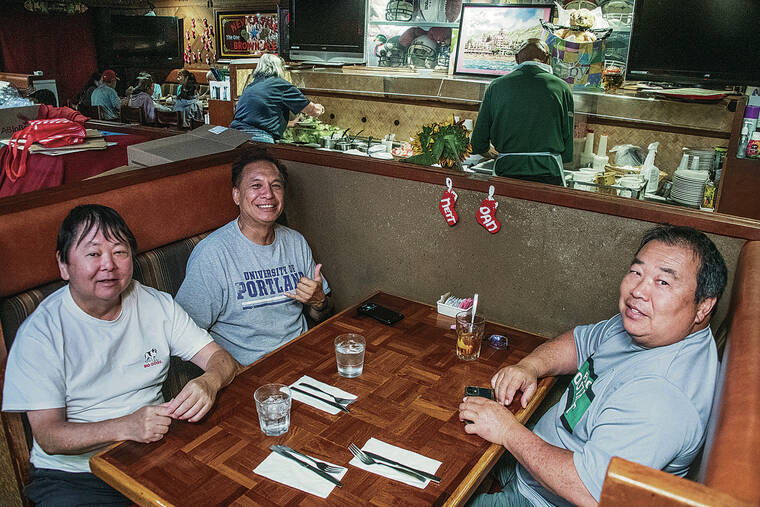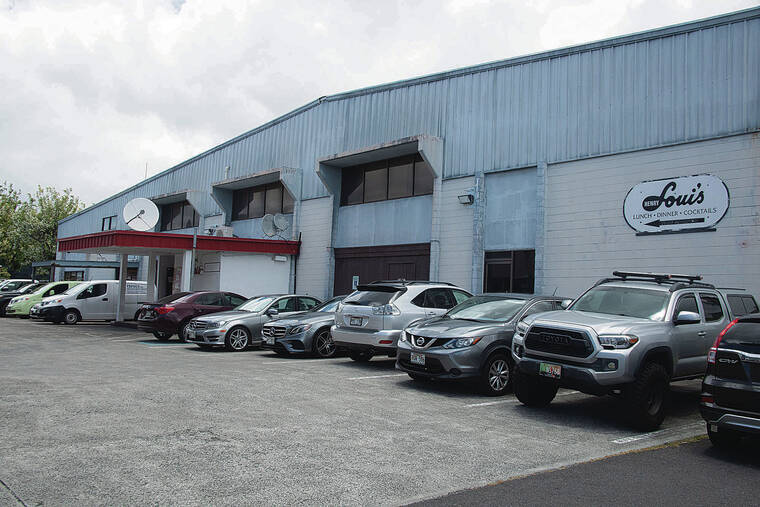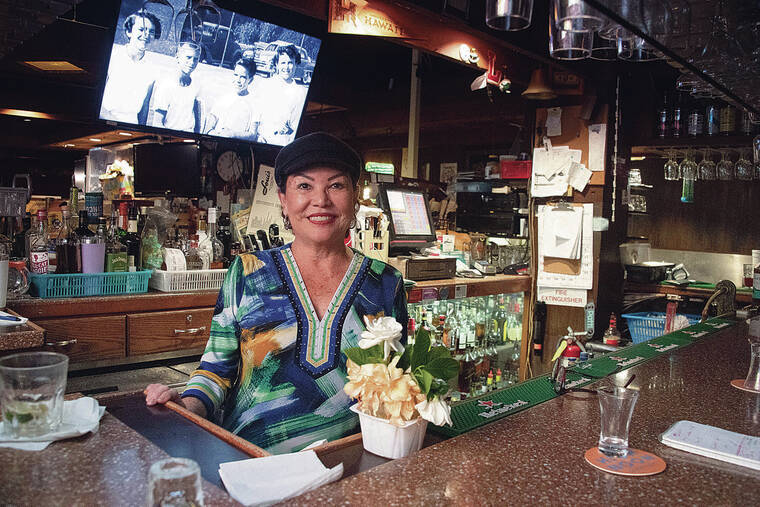Mapunapuna complex’s displaced tenants are forced to make way for a Home Depot

CRAIG T. KOJIMA / CKOJIMA@STARADVERTISER.COM
Riki Tasaka, left, Glenn Fong and Kevin Nishina had lunch at Henry Loui’s on Wednesday. The restaurant and dozens of neighboring Mapunapuna businesses are closing to make way for a Home Depot.

CRAIG T. KOJIMA / CKOJIMA@STARADVERTISER.COM
The restaurant and dozens of neighboring Mapunapuna businesses are closing to make way for a Home Depot.

CRAIG T. KOJIMA / CKOJIMA@STARADVERTISER.COM
Henry Loui’s in Mapunapuna plans to serve its last customers through midnight tonight. Donna Feldmann, a Henry Loui’s manager for 25 years, said customers waited outside for as long as 45 minutes before the restaurant’s opening Wednesday. “It’s like an ohana here,” Feldmann said.



A few dozen local small businesses on Oahu, including a restaurant and bar with a 64-year legacy, are being displaced to make way for national big-box retailer Home Depot.
The home-improvement chain has been working for close to a year or longer on plans for a new store on 1.4 acres in Mapunapuna once anchored by Asian grocery store 99 Ranch Market, and now tenants have until July 15 to move out.
David Lokar, co-owner of Henry Loui’s, a restaurant and bar that has been at the site since 1980 but dates back to 1958 in Waikiki, said the forced shutdown affecting his 44 employees is sad and painful.
“It’s kind of the worst-case scenario,” he said, explaining that the business rebounded over the past two years from financial losses due to the coronavirus pandemic only to be pushed out by Home Depot, which has three stores on Oahu in Iwilei, Pearl City and Kapolei.
Furthermore, Lokar said, local culture is being eroded by the displacement of tenants in the complex that include ethnic food purveyors, some of whom are mom-and-pop operators, along with service providers and other retailers.
“They put 42 small local businesses out of business,” he said. “These people have to look for a new livelihood.”
Don't miss out on what's happening!
Stay in touch with breaking news, as it happens, conveniently in your email inbox. It's FREE!
Beth Madlangbayan, owner of Kusina Korner Filipino Food at the complex known as Moanalua 99 or Ranch 99, plans to cease business July 9. She said finding somewhere to relocate has been difficult after building up a good customer base over the past 10 years.
“It’s really hard,” she said.
Joe Rapp, founder of Hawaiian Island Twisters, a nonprofit gymnastics training and recreation center that has been at the complex since 2004, has been looking for about 12,000 square feet of space with a ceiling height of 24 feet to continue his business serving more than 750 students.
Varouj Artinjian, owner of Mary’s Mediterranean Kitchen, has three real estate brokers trying to find a viable place to reestablish his family-owned business, preferably in Mapunapuna.
“All my customers are here,” he said. “This is worse than the pandemic.”
Several business operators at the complex said they have been inundated with lamenting customers since word began spreading in recent weeks that Home Depot was taking over the space. Perhaps nowhere else was this on display Wednesday more than at Henry Loui’s, which plans to serve its last customers through midnight tonight.
“I had to come say aloha,” said Sandy Hornbeak, who stopped in for lunch with her sister. “These people are like family.”
Hornbeak said that around 35 years ago her brother and a cousin, who were then working at a nearby lumber business, started going to Henry Loui’s every Friday night with friends and family.
“Sing karaoke was the main thing,” Hornbeak said. “And fellowship. And the ribs are suckin’ good.”
Makai Moffett, who lives in Kahala, dropped in for takeout food Wednesday and spent time talking story with staff and other customers.
“Best of old school,” he said. “Good people. Good food. Feels like family. It’s the end of an era.”
Donna Feldmann, a Henry Loui’s manager for 25 years who was bartending Wednesday, said the hangout added warm character to the industrial neighborhood.
“It’s really sad,” she said.
When Feldmann arrived for work Wednesday, she said customers were waiting outside, some for as long as 45 minutes prior to the restaurant’s 11 a.m. opening. Hugs and many good wishes along with food and drink flowed after the doors opened.
“It’s like an ohana here,” she said, noting that some of her co-workers have spent close to 30 years at the company, which was established by local chef Henry Loui in 1958 on Ena Road in Waikiki as Kalia Gardens, a Cantonese restaurant.
Later, Loui moved the business to Beach Walk in Waikiki and then shifted to steak and seafood fare under the Henry Loui’s name before moving to Mapunapuna in 1980. Loui died in 1991, and the business was acquired by longtime manager Anson Kaneshiro, the late Ron Lokar, and Lokar’s son, David.
Lokar said there are no plans to reestablish Henry Loui’s because of what had to be overcome with COVID-19 and the expense to open somewhere else.
All Moanalua 99 tenants received a letter May 27 from real estate brokerage and management firm JLL informing them that the longtime operator of the retail complex, Honolulu Warehouse Co. Ltd., had sold its leasehold interest and therefore all tenant leases were ending. The notice followed earlier notifications to tenants about the effort by Honolulu Warehouse to sell its interest.
Home Depot, which acquired the warehouse complex from Honolulu Warehouse, entered into a 20-year ground lease on May 23 with landowner LTMAC Properties LLC valued at $28.8 million, according to property records.
Turning Moanalua 99 into a Home Depot represents yet another reuse of a warehouse that has been on the site since 1968.
The late Hiroshi Kobayashi, who headed Honolulu Warehouse, in 1998 converted the warehouse into a marketplace named Moanalua Ethnic Village featuring a collection of Asian product retailers and anchored by 99 Ranch Market, which was described at the time as Hawaii’s largest Asian market.
Moanalua Ethnic Village also included a post office, bank, other service businesses, restaurants and a food court.
The grocery anchor closed in 2007, and in recent years the tenant mix became mainly food-court eateries mixed with retail kiosks, a couple of full-service restaurants and several service providers including a paintball supply store, dry cleaner and nail salon.
Kobayashi died about two years ago, and his wife, Yumiko, heads Honolulu Warehouse.
Last year, Norman Cheng, a local attorney representing Honolulu Warehouse, told state officials the company was on the verge of bankruptcy because of closures and tenant rent delinquencies triggered by COVID-19 impacts.
Selling the leasehold interest to Home Depot provided Honolulu Warehouse a way out of its difficulty. Now, many small businesses have their own challenge.
The roughly 125,000- square-foot Home Depot is slated to open next year.




